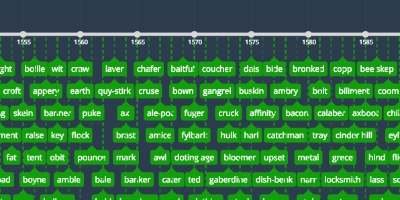jan 1, 1568 - twitchel
Description:
A word formerly common over a wide area, said to mean a narrow passage or alley. It survives in minor place-names such as Twitchill Farm in the Derbyshire parish of Hope, on record from 1376 (PNDb120), and in Nottingham where a street was described as <i>the common twechell</i> in 1435 (PNNt21). It is considered to be from an Old English word <i>twicen</i> which is a derivative of ‘two’, descriptive of the fork between two roads, perhaps at a junction or cross roads. </br>That does not exactly fit the meaning in Yorkshire where it referred in the earliest records to pieces of arable. A Flockton deed of 1311 describes land ‘in the fields of <i>Floketon</i>’ lying in the place called <i>le Thwychel</i>, between lands held by Baldwin le Tyas on one side and John the Miller on the other, and the same two men are referred to again in 1343 when half an acre of arable lay in different parts of ‘the place called <i>Twechill</i>’ (YRS69/58). Similarly, two Byland Abbey charters mention a ‘culture’ called <i>Twychel</i> in the period 1204-9: this was said to lie ‘in the region of Denby’, that is Denby on Grange Moor (SS208/89-90) which would have been very close to Flockton. However, there is nothing in the records which directly links the two places. Other examples are the ‘land called <i>Twytchill</i>’ in Bradfield in 1568 (TWH28/127), and Twitch Hill in Horbury.Added to timeline:
Date:
jan 1, 1568
Now
~ 457 years ago
